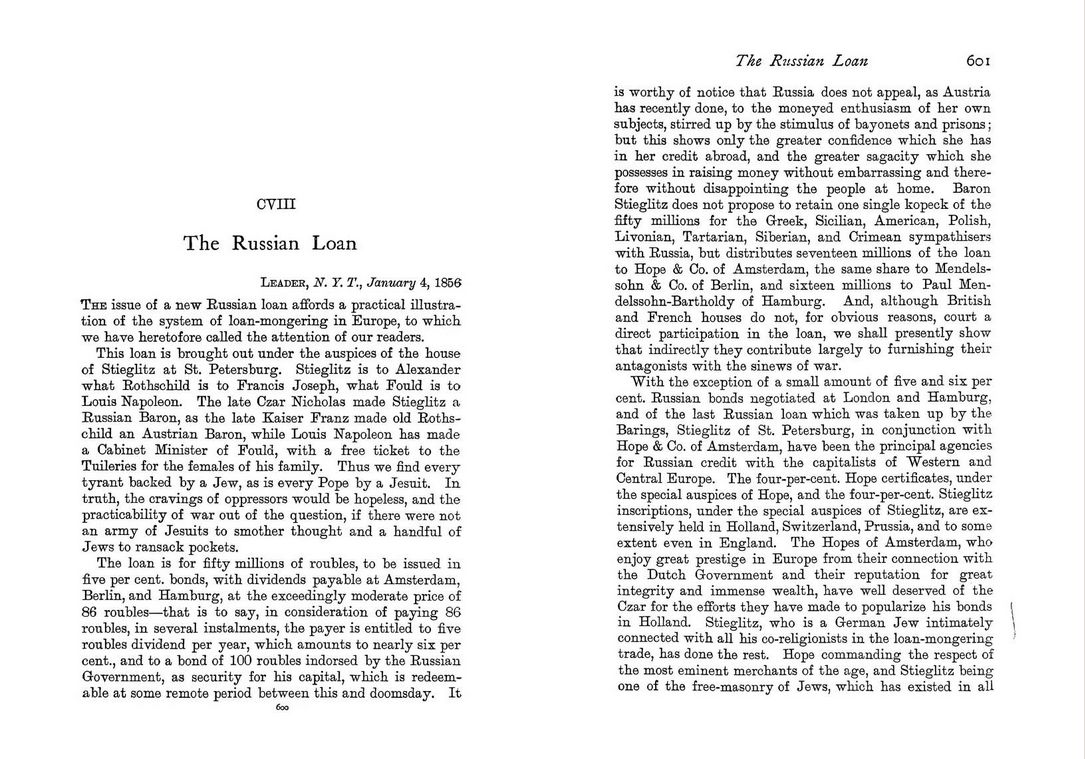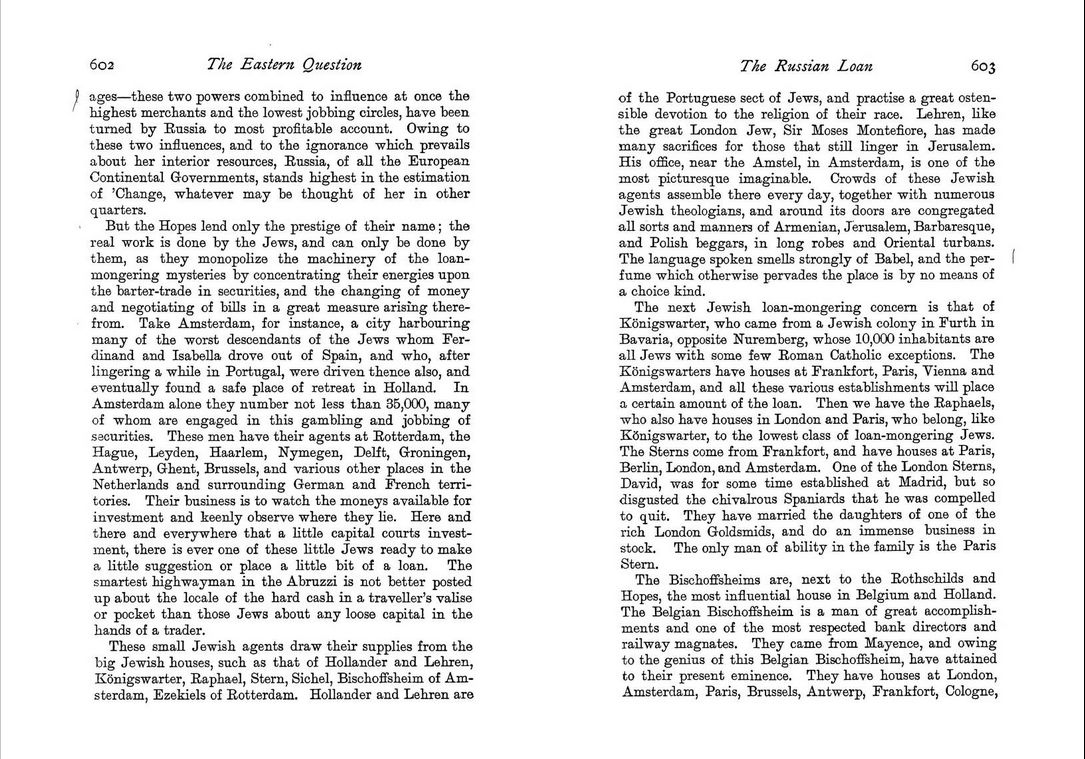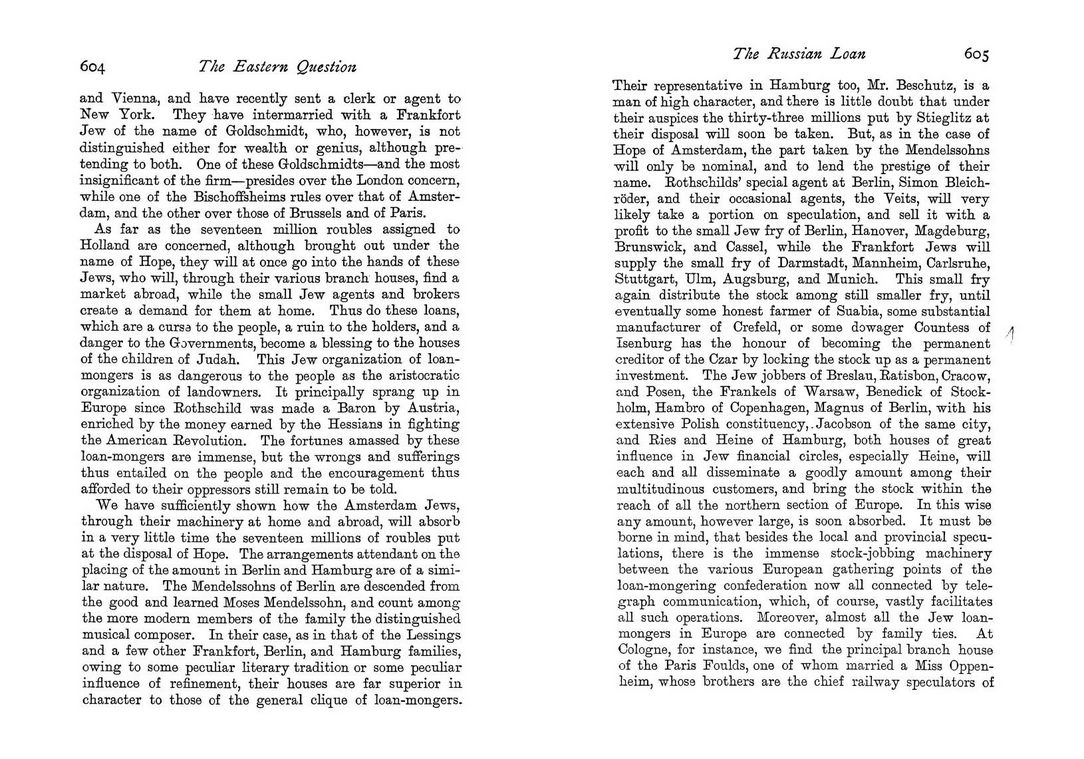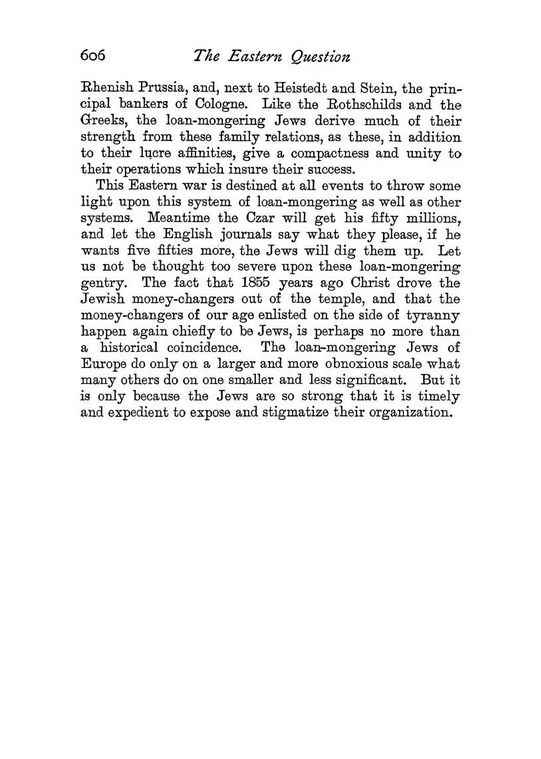"The loan-mongering Jews of
Europe do only on a larger
and more obnoxious scale
what many others do on one
smaller and less
significant. But it is only
because the Jews are so
strong that it is timely and
expedient to expose and
stigmatize their
organization."
— Karl Marx, 1856
The following article which appeared
in the January 4, 1856 edition of the New
York Daily Tribune, isn't credited
to Karl Marx, but it does appear in a collection of
his articles published in 1897 by his
daughter Eleanor.
The Russian Loan
The issue of a new Russian loan
affords a practical illustration of
the system of loan-mongering in
Europe, to which, we have heretofore
called the attention of our readers.
This loan is brought out under the
auspices of the house of Stieglitz
at St. Petersburg. Stieglitz is to
Alexander what Rothschild is to
Francis Joseph, what Fould is to
Louis Napoleon. The late Czar
Nicholas made Stieglitz a Russian
Baron, as the late Kaiser Franz made
old
Rothschild an
Austrian Baron, while Louis Napoleon
has made a Cabinet Minister of
Fould, with a free ticket to the
Tuileries for the females of his
family. Thus
we find every tyrant backed by a
Jew, as is every Pope by a Jesuit.
In truth, the cravings of oppressors
would be hopeless, and the
practicability of war out of the
question, if there were not an army
of Jesuits to smother thought and a
handful of Jews to ransack pockets.
The loan is for fifty millions of
roubles, to be issued in five per
cent, bonds, with dividends payable
at Amsterdam, Berlin, and Hamburg,
at the exceedingly moderate price of
86 roubles—that is to say, in
consideration of paying 86 roubles,
in several instalments, the payer is
entitled to five roubles dividend
per year, which amounts to nearly
six per cent, and to a bond of 100
roubles indorsed by the Russian
Government, as security for his
capital, which is redeemable at some
remote period between this and
doomsday. It is worthy of notice
that Russia does not appeal, as
Austria has recently done, to the
moneyed enthusiasm of her own
subjects, stirred up by the stimulus
of bayonets and prisons ; but this
shows only the greater confidence
which she has in her credit abroad,
and the greater sagacity which she
possesses in raising money without
embarrassing and therefore without
disappointing the people at home.
Baron Stieglitz does not propose to
retain one single kopeck of the
fifty millions for the Greek,
Sicilian, American, Polish,
Livonian, Tartarian, Siberian, and
Crimean sympathisers with Russia,
but distributes seventeen millions
of the loan to Hope & Co. of
Amsterdam, the same share to
Mendelssohn & Co. of Berlin, and
sixteen millions to Paul
Mendelssohn-Bartholdy of Hamburg.
And, although British and French
houses do not, for obvious reasons,
court a direct participation in the
loan, we shall presently show that
indirectly they contribute largely
to furnishing their antagonists with
the sinews of war.
With the exception of a small amount
of five and six per cent. Russian
bonds negotiated at London and
Hamburg, and of the last Russian
loan which was taken up by the
Barings, Stieglitz of St.
Petersburg, in conjunction with Hope
& Co. of Amsterdam, have been the
principal agencies for Russian
credit with the capitalists of
Western and Central Europe. The
four-per-cent. Hope certificates,
under the special auspices of Hope,
and the four-per-cent. Stieglitz
inscriptions, under the special
auspices of Stieglitz, are
extensively held in Holland,
Switzerland, Prussia, and to some
extent even in England. The Hopes of
Amsterdam, who enjoy great prestige
in Europe from their connection with
the Dutch Government and their
reputation for great integrity and
immense wealth, have well deserved
of the Czar for the efforts they
have made to popularize his bonds in
Holland. Stieglitz, who is
a German Jew intimately connected
with all his co-religionists in the
loan-mongering trade,
has done the rest. Hope commanding
the respect of the most eminent
merchants of the age, and Stieglitz
being one of
the free-masonry of Jews,
which has existed in all ages—these
two powers combined to influence at
once the highest merchants and the
lowest jobbing circles, have been
turned by Russia to most profitable
account. Owing to these two
influences, and to the ignorance
which prevails about her interior
resources, Russia, of all the
European Continental Governments,
stands highest in the estimation of
Change, whatever may be thought of
her in other quarters.
But the Hopes lend only the prestige
of their name ;
the real work is done by the Jews,
and can only be done by them, as
they monopolize the machinery of the
loan-mongering mysteries
by concentrating their energies upon
the barter-trade in securities, and
the changing of money and
negotiating of bills in a great
measure arising there-from.
Take Amsterdam, for instance, a city
harbouring many of the worst
descendants of the Jews whom
Ferdinand and Isabella drove out of
Spain,
and who, after lingering a while in
Portugal, were driven thence also,
and eventually found a safe place of
retreat ia Holland. In Amsterdam
alone they number not less than
35,000, many of whom are engaged in
this gambling and jobbing of
securities. These men have their
agents at Rotterdam, the Hague,
Leyden, Haarlem, Nymegen, Delft,
Groningen, Antwerp, Ghent, Brussels,
and various other places in the
Netherlands and surrounding German
and French territories. Their
business is to watch the moneys
available for investment and keenly
observe where they lie. Here and
there and everywhere that a little
capital courts investment, there is
ever one of these little Jews ready
to make a little suggestion or place
a little bit of a loan. The smartest
highwayman in the Abruzzi is not
better posted up about the locale of
the hard cash in a traveller's
valise or pocket than those Jews
about any loose capital in the hands
of a trader.
These small Jewish agents draw their
supplies from the big Jewish houses,
such as that of Hollander and
Lehren, Königswarter, Raphael,
Stern, Sichel, Bischoffsheim of
Amsterdam, Ezekiels of Rotterdam.
Hollander and Lehren are of the
Portuguese sect of Jews, and
practise a great ostensible devotion
to the religion of their race.
Lehren, like the great London Jew,
Sir Moses Montefiore, has made many
sacrifices for those that still
linger in Jerusalem. His office,
near the Amstel, in Amsterdam, is
one of the most picturesque
imaginable. Crowds of these Jewish
agents assemble there every day,
together with numerous Jewish
theologians, and around its doors
are congregated all sorts and
manners of Armenian, Jerusalem,
barbaresque, and Polish beggars, in
long robes and Oriental turbans. The
language spoken smells strongly of
Babel, and the perfume which
otherwise pervades the place is by
no means of a choice kind.
The next Jewish loan-mongering
concern is that of Königswarter, who
came from a Jewish colony in Forth
in Bavaria, opposite Nuremberg,
whose 10,000 inhabitants are all
Jews with some few Roman Catholic
exceptions. The Königswarters have
houses at Frankfort, Paris, Vienna
and Amsterdam, and all these various
establishments will place a certain
amount of the loan. Then we have the
Raphaels, who also have houses in
London and Paris, who belong, like
Königswarter, to the lowest class of
loan-mongering Jews. The Sterns come
from Frankfurt, and have houses at
Paris, Berlin, London, and
Amsterdam. One of the London Sterns,
David, was for some time established
at Madrid, but so disgusted the
chivalrous Spaniards that he was
compelled to quit. They have married
the daughters of one of the rich
London Goldsmiths, and do an immense
business in stock. The only man of
ability in the family is the Paris
Stern.
The Bischoffsheims are, next to the
Rothschilds and Hopes, the most
influential house in Belgium and
Holland. The Belgian Bischoffsheim
is a man of great accomplishments
and one of the most respected bank
directors and railway magnates. They
came from Mayence, and owing to the
genius of this Belgian
Bischoffsheim, have attained to
their present eminence. They have
houses at London, Amsterdam, Paris,
Brussels, Antwerp, Frankfurt,
Cologne, and Vienna, and have
recently sent a clerk or agent to
New York. They have intermarried
with, a Frankfort Jew of the name of
Goldschmidt, who, however, is not
distinguished either for wealth or
genius, although pretending to both.
One of these Goldschmidts—and the
most insignificant of the
firm—presides over the London
concern, while one of the
Bischoffsheims rules over that of
Amsterdam, and the other over those
of Brussels and of Paris.
As far as the seventeen million
roubles assigned to Holland are
concerned, although brought out
under the name of Hope, they will at
once go into the hands of these
Jews, who will, through their
various branch houses, find a market
abroad, while the small Jew agents
and brokers create a demand for them
at home. Thus do these loans, which
are a curse to the people, a ruin to
the holders, and a danger to the
Governments, become a blessing to
the houses of the children of Judah. This
Jew organization of loan-mongers is
as dangerous to the people as the
aristocratic organization of
landowners. It principally sprang up
in Europe since Rothschild was made
a Baron by Austria,
enriched by the money earned by the
Hessians in fighting the American
Revolution. The fortunes amassed by
these loan-mongers are immense, but
the wrongs and sufferings thus
entailed on the people and the
encouragement thus afforded to their
oppressors still remain to be told.
We have sufficiently shown how the
Amsterdam Jews, through their
machinery at home and abroad, will
absorb in a very little time the
seventeen millions of roubles put at
the disposal of Hope. The
arrangements attendant on the
placing of the amount in Berlin and
Hamburg are of a similar nature. The
Mendelssohns of Berlin are descended
from the good and learned Moses
Mendelssohn, and count among the
more modern members of the family
the distinguished musical composer.
In their case, as in that of the
Lessings and a few other Frankfort,
Berlin, and Hamburg families, owing
to some peculiar literary tradition
or some peculiar influence of
refinement, their houses are far
superior in character to those of
the general clique of loan-mongers.
Their representative in Hamburg too,
Mr. Beschutz, is a man of high
character, and there is little doubt
that under their auspices the
thirty-three millions put by
Stieglitz at their disposal will
soon be taken. But, as in the case
of Hope of Amsterdam, the part taken
by the Mendelssohns will only be
nominal, and to lend the prestige of
their name, Rothschilds' special
agent at Berlin, Simon Bleichröder,
and their occasional agents, the
Veits, will very likely take a
portion on speculation, and sell it
with a profit to the small Jew fry
of Berlin, Hanover, Magdeburgh,
Brunswick, and Cassel, while the
Frankfort Jews will supply the small
fry of Darmstadt, Mannheim,
Carlsruhe, Stuttgart, Ulm, Augsburg,
and Munich. This small fry again
distribute the stock among still
smaller fry, until eventually some
honest farmer of Suabia, some
substantial manufacturer of Crefeld,
or some dowager Countess of Isenburg
has the honour of becoming the
permanent creditor of the Czar by
locking the stock up as a permanent
investment. The Jew jobbers of
Breslau, Ratisbon, Cracow, and
Posen, the Frankels of Warsaw,
Benedick of Stockholm, Hambro of
Copenhagen, Magnus of Berlin, with
his extensive Polish constituency,
Jacobson of the same city, and Ries
and Heine of Hamburg, both houses of
great influence in Jew financial
circles, especially Heine, will each
and all disseminate a goodly amount
among their multitudinous customers,
and bring the stock within the reach
of all the northern section of
Europe. In this wise any amount,
however large, is soon absorbed. It
must be borne in mind, that besides
the local and provincial
speculations, there is the immense
stock-jobbing machinery between the
various European gathering points of
the loan-mongering confederation now
all connected by telegraph
communication, which, of course,
vastly facilitates all such
operations. Moreover,
almost all the Jew loan-mongers in
Europe are connected by family ties. At
Cologne, for instance, we find the
principal branch house of the Paris
Foulds, one of whom married a Miss
Oppenheim, whose brothers are the
chief railway speculators of Rhenish
Prussia, and, next to Heistedt and
Stein, the principal bankers of
Cologne. Like the
Rothschilds and the Greeks, the
loan-mongering Jews derive much of
their strength from these family
relations, as these, in addition to
their lucre affinities, give a
compactness and unity to their
operations which insure their
success.
This Eastern war is destined at all
events to throw some light upon this
system of loan-mongering as well as
other systems. Meantime the Czar
will get his fifty millions, and let
the English journals say what they
please, if he wants five fifties
more, the Jews will dig them up. Let
us not be thought too severe upon
these loan-mongering gentry. The
fact that 1855 years ago Christ
drove the Jewish money-changers out
of the temple, and that the
money-changers of our age enlisted
on the side of tyranny happen again
chiefly to be Jews, is perhaps no
more than a historical coincidence.
The loan-mongering Jews of Europe do
only on a larger and more obnoxious
scale what many others do on one
smaller and less significant. But it
is only because the Jews are so
strong that it is timely and
expedient to expose and stigmatize
their organization.
New York Daily Tribune, Friday,
January 4, 1856, p.4
This newspaper can be accessed through
this excellent New York State newspaper
archive site:



























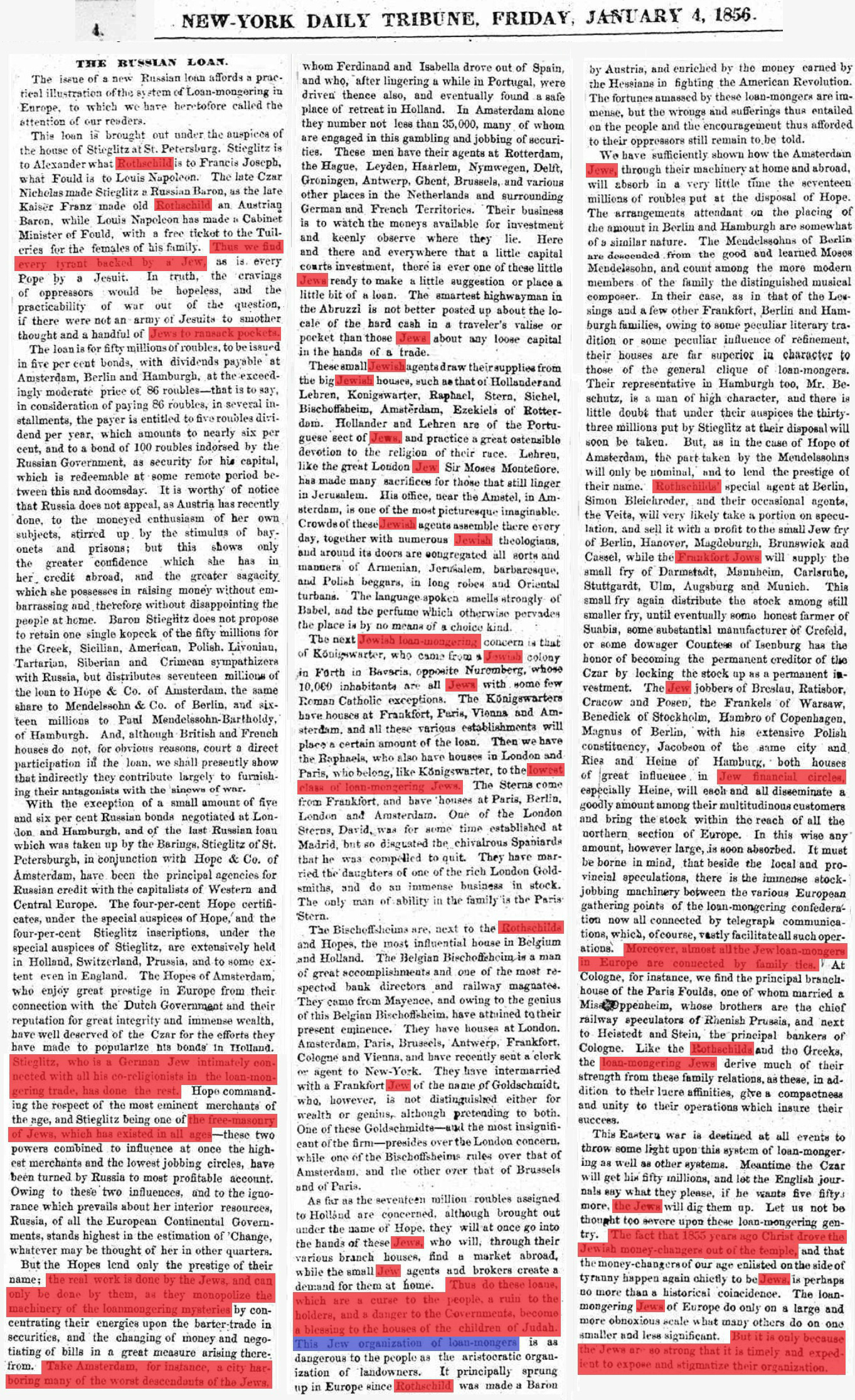
.jpg)
